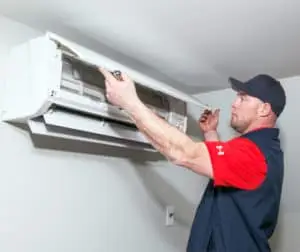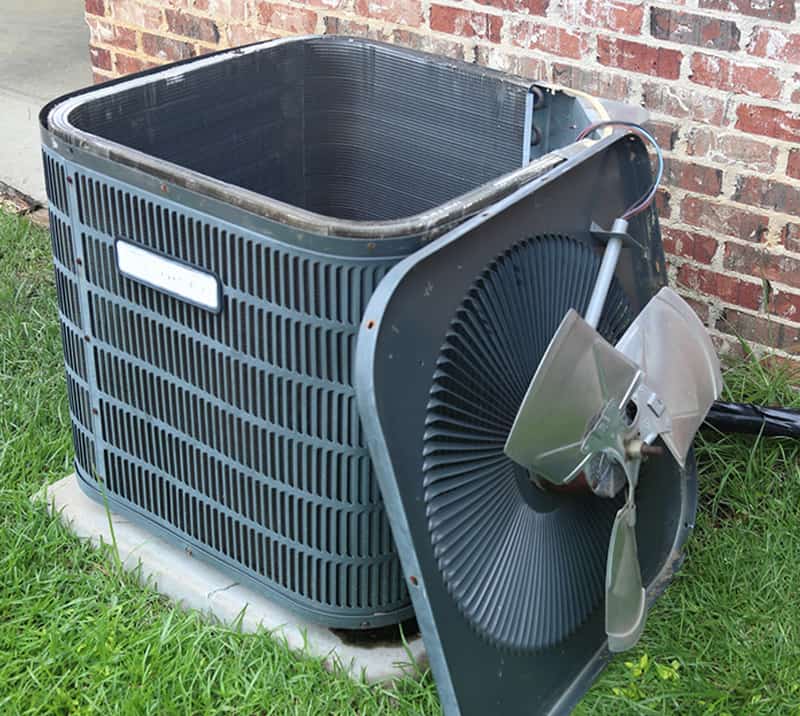The answer is, it depends. But there are multiple factors you should know about that impact the final price of an air conditioner installation.
So, it’s time to replace your old cooling system. With many options and factors to consider, we know that installing a new air conditioner can be an intimidating process. One of the biggest concerns people have about installing an AC is the cost.
Read on to learn more about why air conditioners can be so expensive and what factors go into the final price of installing or replacing your current cooling system.
Types of AC Systems
The type of air conditioner installed will be the main factor in determining the price. Choosing the right type of AC for you will mostly depend on whether the house structure requires a specific cooling method. Another factor to keep in mind when deciding what type of air conditioner to buy is whether the entire building needs to be cooled by the system. If only one room or space needs cooling, air conditioning costs will likely decrease.
Two common types of air conditioning are central air conditioning and ductless air conditioning.
Central AC
A central air conditioning system cools the home by circulating cool air through a system of ducts. The cold air blows out of vents in the walls or ceilings and into each room, lowering the temperature.
Split vs. Packaged AC Systems
The style of central air conditioning system you choose will affect the final cost. A split system includes equipment installed both inside and outside the house. On the other hand, a packaged unit keeps all the equipment in one place inside the home.
Typically, a packaged unit will be more economical to install because it requires less labor than a split-system unit. In addition, packaged units often also contain heating features, eliminating the need to pay for a separate home heating system.
Ductwork is Required
The cost of a central air conditioning installation will also depend on the quality of the ductwork in the home. Aging ductwork in an older home may need replacing before installing the new air conditioner, adding an extra expense to the project.
Ductless AC
A ductless air conditioning system, or ductless mini-split system, is another common type of air conditioner. A ductless system involves an indoor unit and an outdoor unit. No complex duct system is required for this style system to work. Homeowners can place multiple indoor units throughout the home, in whichever rooms need air conditioning.
Ductless vs. Central AC
Ductless mini-split systems are usually less expensive than traditional central air conditioning. The pricing varies based on the system brand and how many rooms will require units. The initial purchase may also be more expensive if it is a high-efficiency system.
Overall, ductless air conditioning systems are more energy-efficient than traditional central air. As a result, purchasing a ductless air conditioning system can be an excellent long-term investment.
Ductwork Not Required
Not every home will have ducts already in place. Many homes in New England, for example, are older and were built without ductwork – in these cases, ductless AC is a practical and convenient solution.
As a company that serves both New Hampshire and Massachusetts, many of our customers choose ductless AC as their ideal cooling solution. We are also proud to say that Heritage Home Service is a Diamond Dealer in Mitsubishi ductless air conditioners.
Factors in Determining the Cost of a Central AC Unit
When planning the installation of a central air conditioning unit, there are several factors to consider when estimating the cost.
Labor
The Company You Choose

Labor is one of the most expensive and variable costs associated with installing a central air conditioning unit. You can’t compare the cost of installation between different cities or states because labor costs will vary widely in different locations depending on the cost of living and wage expectations.
Labor costs will also depend on the particular company’s pricing policies. Most companies will charge labor by the hour, with a minimum fee. With Heritage, we don’t charge by the hour, we charge by the job.
Complexity of Installation
The specific central air conditioning model will also alter the labor expenses. For instance, the complex installation process for a split-system unit will take more time and require more technicians, increasing labor costs.
Ductwork
Ductwork is a major concern when installing central air conditioning. The entire cooling system relies on the home’s ductwork, so issues with the ductwork will cause associated expenses to rise rapidly.
If there isn’t any pre-existing ductwork in the home, air ducts will have to be installed. The cost of the ducts, installation equipment, and labor will add to the cost of getting central air.
Many homes already have ductwork, but the ductwork isn’t sufficient for the new air conditioning system – this is especially common in older buildings that don’t have the infrastructure to support contemporary air conditioning technology.
Upgrading the ductwork will add extra money to the cost of installing the air conditioning. If expensive new ductwork needs to be installed, it may be prudent to consider ductless air conditioning instead.
Size of the Home

The size of the home will also have a big impact on the cost of central air conditioning. As a general rule, the larger the home, the more the central air conditioning will cost. This concept applies to every expense associated with air conditioning:
- A large home will require a central air system with the ability to cool the entire space. A more powerful air conditioning unit will be more expensive.
- If the home needs new ductwork or repairs, a larger space will require more air ducts and installation labor.
- Finally, there will be long-term costs from all the energy needed to circulate cool air throughout a big house.
When you schedule a consultation with an HVAC company for a new air conditioner, a major part of the appointment will involve sizing the home. This allows the contractor to customize their system recommendations and ensures that your new AC is not too big or too small for your home and needs.
Size of the System
A bigger central air conditioning system will cost more money. Some people may be tempted to get a smaller system to lower costs upfront. However, an undersized air conditioning system will lead to higher expenses down the road.
A small system will struggle to cool a large home and won’t last long. The repairs and replacement costs of an undersized system will quickly outweigh any money saved on the initial installation.
SEER Rating
Another element that impacts the cost of air conditioning is the SEER rating. SEER stands for Seasonal Energy Efficiency Ratio. A SEER rating measures the energy efficiency of a cooling system. The rating is derived from an equation that compares a system’s cooling capacity with the energy input. The higher the SEER rating, the more energy-efficient the air conditioning system.
States have different regulations for what level SEER rating a home air conditioning system should have. As of January 2023, all home central air conditioning systems in New Hampshire and Massachusetts must have a SEER rating of 14 or higher.
Some homeowners choose to purchase a central air conditioning system with a higher SEER than legally required. While a more energy-efficient system will cost more money upfront, it can significantly save money on your electricity bill throughout the system’s lifespan.
Existing AC System Removal
Installing central air conditioning will also cost more if an existing air conditioning system needs to first be removed. With Heritage, we will remove the old system and replace it with the new one and take the old system out of your hands
With Heritage, when we install your new air conditioning system, we will remove the old system and take it out of your hands. No need to figure out where to dispose of all that old equipment!
Add-Ons
Any special air conditioning features beyond the basic system will add to the overall price. Many homeowners opt to get air quality features to improve the home environment. Humidifiers and dehumidifiers are also common add-ons.
Another expensive addition to an air conditioning system is a smart thermostat. While a smart thermostat is an added cost, it can help the homeowner regulate the central AC and save money on energy in the long run.
Additional Cost Factors for Ductless AC Installation

A ductless air conditioning system costs less money than a central air conditioning system. However, while the cooling unit has a lower price tag, consumers still need to consider all of the potential associated costs.
Number of Units
The major factor that impacts the cost of a ductless system is the number of rooms that need cooling units. For a ductless system to effectively cool an entire home, several cooling units will need to be installed throughout the house.
Save on Rebates
If you’re worried about the cost of your new air conditioner, consider looking into the tax rebates that your state offers for qualifying products. Be aware that each state handles these programs differently.
If you live in Massachusetts or New Hampshire, you can learn about your local rebate programs here:
Is It Worth It to Replace My AC Unit?
Replacing an air conditioning unit can be a costly undertaking, but it is often necessary. Consider some of the following factors when determining whether it’s time to replace an air conditioning unit:
- What is the lifespan of the new air conditioning unit? On average, an air conditioner has a 15-year life expectancy if maintained properly. A new unit is a good investment if your current system is over ten years old, and the newer model will last for a long time without needing costly repairs.
- Are electric bills unusually high? High electric bills are often a sign to upgrade to a more energy-efficient cooling system.
- Avoiding frequent repairs will save money. If an old air conditioning unit constantly needs repairs, the household may be spending more money in total than it would cost to get an entirely new system. Keeping your system maintained with annual system checks will prevent future repairs and keep your AC working as efficiently as possible.
- Old air conditioning units have bad airflow. There’s no reason to spend money on an electric bill for an air conditioning unit that simply doesn’t work well. If the system produces a limited airflow, it’s time for an update.
- A foul smell is coming from the unit. When an air conditioner unit starts to smell, it probably needs replacement. A smelly air conditioning system can impact a home’s air quality and the overall effectiveness of the cooling system.
Getting a new air conditioner doesn’t need to be a stressful or expensive process. Many HVAC companies also offer financing options, including Heritage Home Service.
If you live in New Hampshire or Massachusetts, you contact Heritage Home Service today to find the AC system that works best for your home, cooling needs, and budget.

Financing Made Easy
When you choose Heritage, you can rest easy knowing that we provide straightforward options to help you budget for a complete solution that will last you for decades to come.
VIEW FINANCING OPTIONS
Complete Care Plan
With Complete Care, enjoy peace of mind knowing your home's plumbing, heating, cooling, and electrical needs are handled year after year—hassle-free, with added benefits.
VIEW PLAN







